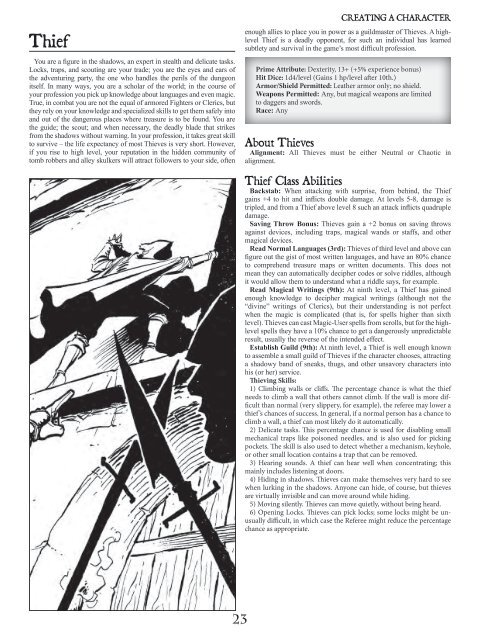Swords-Wizardry-Complete-revised
Swords-Wizardry-Complete-revised
Swords-Wizardry-Complete-revised
You also want an ePaper? Increase the reach of your titles
YUMPU automatically turns print PDFs into web optimized ePapers that Google loves.
Thief<br />
You are a figure in the shadows, an expert in stealth and delicate tasks.<br />
Locks, traps, and scouting are your trade; you are the eyes and ears of<br />
the adventuring party, the one who handles the perils of the dungeon<br />
itself. In many ways, you are a scholar of the world; in the course of<br />
your profession you pick up knowledge about languages and even magic.<br />
True, in combat you are not the equal of armored Fighters or Clerics, but<br />
they rely on your knowledge and specialized skills to get them safely into<br />
and out of the dangerous places where treasure is to be found. You are<br />
the guide; the scout; and when necessary, the deadly blade that strikes<br />
from the shadows without warning. In your profession, it takes great skill<br />
to survive – the life expectancy of most Thieves is very short. However,<br />
if you rise to high level, your reputation in the hidden community of<br />
tomb robbers and alley skulkers will attract followers to your side, often<br />
Creating a character<br />
enough allies to place you in power as a guildmaster of Thieves. A highlevel<br />
Thief is a deadly opponent, for such an individual has learned<br />
subtlety and survival in the game’s most difficult profession.<br />
Prime Attribute: Dexterity, 13+ (+5% experience bonus)<br />
Hit Dice: 1d4/level (Gains 1 hp/level after 10th.)<br />
Armor/Shield Permitted: Leather armor only; no shield.<br />
Weapons Permitted: Any, but magical weapons are limited<br />
to daggers and swords.<br />
Race: Any<br />
About Thieves<br />
Alignment: All Thieves must be either Neutral or Chaotic in<br />
alignment.<br />
Thief Class Abilities<br />
Backstab: When attacking with surprise, from behind, the Thief<br />
gains +4 to hit and inflicts double damage. At levels 5-8, damage is<br />
tripled, and from a Thief above level 8 such an attack inflicts quadruple<br />
damage.<br />
Saving Throw Bonus: Thieves gain a +2 bonus on saving throws<br />
against devices, including traps, magical wands or staffs, and other<br />
magical devices.<br />
Read Normal Languages (3rd): Thieves of third level and above can<br />
figure out the gist of most written languages, and have an 80% chance<br />
to comprehend treasure maps or written documents. This does not<br />
mean they can automatically decipher codes or solve riddles, although<br />
it would allow them to understand what a riddle says, for example.<br />
Read Magical Writings (9th): At ninth level, a Thief has gained<br />
enough knowledge to decipher magical writings (although not the<br />
“divine” writings of Clerics), but their understanding is not perfect<br />
when the magic is complicated (that is, for spells higher than sixth<br />
level). Thieves can cast Magic-User spells from scrolls, but for the highlevel<br />
spells they have a 10% chance to get a dangerously unpredictable<br />
result, usually the reverse of the intended effect.<br />
Establish Guild (9th): At ninth level, a Thief is well enough known<br />
to assemble a small guild of Thieves if the character chooses, attracting<br />
a shadowy band of sneaks, thugs, and other unsavory characters into<br />
his (or her) service.<br />
Thieving Skills:<br />
1) Climbing walls or cliffs. The percentage chance is what the thief<br />
needs to climb a wall that others cannot climb. If the wall is more difficult<br />
than normal (very slippery, for example), the referee may lower a<br />
thief ’s chances of success. In general, if a normal person has a chance to<br />
climb a wall, a thief can most likely do it automatically.<br />
2) Delicate tasks. This percentage chance is used for disabling small<br />
mechanical traps like poisoned needles, and is also used for picking<br />
pockets. The skill is also used to detect whether a mechanism, keyhole,<br />
or other small location contains a trap that can be removed.<br />
3) Hearing sounds. A thief can hear well when concentrating; this<br />
mainly includes listening at doors.<br />
4) Hiding in shadows. Thieves can make themselves very hard to see<br />
when lurking in the shadows. Anyone can hide, of course, but thieves<br />
are virtually invisible and can move around while hiding.<br />
5) Moving silently. Thieves can move quietly, without being heard.<br />
6) Opening Locks. Thieves can pick locks; some locks might be unusually<br />
difficult, in which case the Referee might reduce the percentage<br />
chance as appropriate.<br />
23


